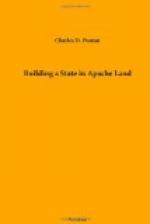The Pima Indians have lived in their villages on the Gila River time immemorial, at least they have no tradition of the time of their coming. Their tribal organization has many features worthy imitation by more civilized people. The government rests with a hereditary chief and a council of sages. The rights of property are protected, as far as they have any individual property, which is small, as they are in fact communists. The water from the Gila River to irrigate their lands is obtained by canals constructed by the common labor of the tribe.
In my intercourse with these Indians for many years they frequently asked questions which would puzzle, the most profound philosopher to answer. For instance, they inquired, “Who made the world and everything therein?”
I replied, “God.”
“Where does he live?”
“In the sky.”
“What does he sit on?”
In their domestic relations they have a system thousands of years older than the Edmunds Act, which works to suit them, and fills the requirements of satisfied nationalities. The old men said the marriage system had given them more trouble than anything else, and they finally abandoned all laws to the laws of nature. The young people were allowed to mate by natural selection, and if they were not satisfied they could “swap.”
In after years, when I was Superintendent of Indian Affairs, I selected a stalwart Pima named Luis, who was proud of his acquirements in the English language, and gave him a uniform, sword, and epaulettes about the size of a saucer, to stand guard in front of my quarters.
One day I came out and found Luis walking with an ununiformed Pima, with their arms around each other’s waists, according to their custom. I inquired, “Luis, who is that?”
“That is my brother-in-law.”
“Did you marry his sister?”
“No.”
“Did he marry your sister?”
“No.”
“Then how is he your brother-in-law?”
“We swapped wives.”
Among the Pimas there is no incentive to avarice, and the accumulation of large personal fortunes. When a Pima dies, most of his personal property, that is, house and household belongings, which he had used during life, is committed to the flames as a sanitary measure, and whatever he may have left of personal property is divided among the tribe.
The dead are buried in the ground in silence, and you can never get the Pimas to pronounce the name of a dead man. The Pimas have many customs resembling the Jews, especially the periodical seclusion of women.
The Apaches have robbed them time immemorial, and they in turn make frequent campaigns against the Apaches. When they return from such a campaign, if they have shed blood they paint their faces black, and seclude themselves from the women. If they have not shed blood they paint their faces white, and enter the joys of matrimony.




